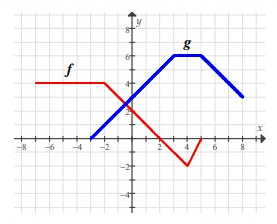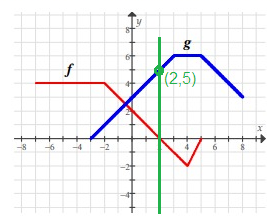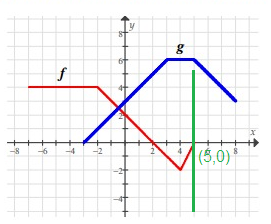PROBLEMS ON COMPOSITION OF FUNCTIONS FROM A GRAPH
Subscribe to our ▶️ YouTube channel 🔴 for the latest videos, updates, and tips.
Answer the following, using the graph below.

Problem 1 :
(a) g(2) (b) f(g(2)) (c) f(2) (d) g(f(2))
Solution:
(a) g(2) :

The value of g(2) from the graph of g(x) is 5.
So, g(2) = 5.
(b) f(g(2)) :

The value of g(2) from the graph of g(x) is 5.
So, f (g(2)) = f(5)

Value of f(5) from the graph f(x) is 0.
Then, the value of f (g(2)) is 0.
(c) f(2) :
The value of f(2) from the graph of f(x) is 0.
So, f(2) = 0.
(d) g(f(2)) :
The value of f(2) from the graph of f(x) is 0.
So, g (f(2)) = g(0)
Value of g(0) from the graph g(x) is 3.
Then, the value of g (f(2)) is 3.
Problem 2 :
(a) g(0) (b) f(g(0)) (c) f(0) (d) g(f(0))
Solution:
(a) g(0) :
The value of g(0) from the graph of g(x) is 3.
So, g(0)) = 3
(b) f(g(0)) :
The value of g(0) from the graph of g(x) is 3.
So, f (g(0)) = f(3)
Value of f(3) from the graph f(x) is -1.
Then, the value of f (g(0)) is -1.
(c) f(0) :
The value of f(0) from the graph of f(x) is 2.
So, f(0)) = 2
(d) g(f(0)) :
The value of f(0) from the graph of f(x) is 2.
So, g (f(0)) = g(2)
Value of g(2) from the graph g(x) is 5.
Then, the value of g (f(0)) is 5.
Problem 3 :
(a) (f ∘ g)(-3) (b) (g ∘ f)(-3)
Solution:
(a) (f ∘ g)(-3) :
(f ∘ g)(-3) = f[g(-3)]
The value of g(-3) is 0.
f[g(-3)] = f(0)
The value of f(0) is 2.
(f ∘ g)(-3) = 2
(b) (g ∘ f)(-3) :
(g ∘ f)(-3) = g[f(-3)]
The value of f(-3) is 4.
g[f(-3)] = g(4)
The value of g(4) is 6.
(g ∘ f)(-3) = 6
Problem 4 :
(a) (f ∘ g)(-1) (b) (g ∘ f)(-1)
Solution:
(a) (f ∘ g)(-1) :
(f ∘ g)(-1) = f[g(-1)]
The value of g(-1) is 2.
f[g(-1)] = f(2)
The value of f(2) is 5.
(f ∘ g)(-1) = 5
(b) (g ∘ f)(-1) :
(g ∘ f)(-1) = g[f(-1)]
The value of f(-1) is 2.
g[f(-1)] = g(2)
The value of g(2) is 5.
(g ∘ f)(-1) = 5
Problem 5 :
(a) (f ∘ f)(3) (b) (g ∘ g)(-2)
Solution:
(a) (f ∘ f)(3) :
(f ∘ f)(3) = f[f(3)]
The value of f(3) is -1.
f[f(3)] = f(-1)
The value of f(-1) is 3.
(f ∘ f)(3) = 3
(b) (g ∘ g)(-2) :
(g ∘ g)(-2) = g[g(-2)]
The value of g(-2) is 1.
g[g(-2)] = g(1)
The value of g(1) is 4.
(g ∘ g)(-2) = 4
Subscribe to our ▶️ YouTube channel 🔴 for the latest videos, updates, and tips.
Recent Articles
-
Finding Range of Values Inequality Problems
May 21, 24 08:51 PM
Finding Range of Values Inequality Problems -
Solving Two Step Inequality Word Problems
May 21, 24 08:51 AM
Solving Two Step Inequality Word Problems -
Exponential Function Context and Data Modeling
May 20, 24 10:45 PM
Exponential Function Context and Data Modeling